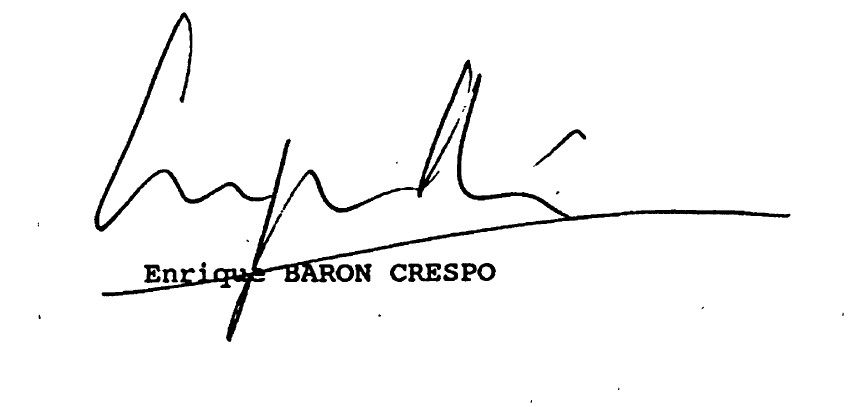Biography
Enrique Barón Crespo was born in Madrid, Spain, on the 27 March 1944. He received a degree in Law from the University of Madrid, a degree in Commerce from ICADE Business School, and was a graduate of ESSEC (Higher School of Economics and Commerce) in Paris, France. He was a lecturer in agricultural economics at the ENEA (National Institute of Agricultural Studies) in Valladolid from 1965 to 1970 and a lecturer in economic structures at Complutense University of Madrid. An active member of the May 1968 movement, he belonged to the Socialist Convergence of Madrid and was one of the leaders of the Federation of Socialist Parties at the start of Spain's transition to democracy.
From 1970 to 1977, Barón Crespo was a practicing lawyer. He actively represented defendants in political cases before the Public Order Tribunal and was equally active in defending trade union leaders.
Since 2009 he is no longer politically active in the European Parliament. He has published several books and written numerous articles about European integration issues. He is also the President and a founding member of the International Yehudi Menuhin Foundation and an administrator of the Friends of Europe think-tank.
Political posts
• 1982-1985: Spanish Minister for Transport, Tourism and Communications under the first Felipe González government (1982-1986)
• 1986-2009: Member of the European Parliament (Group of the Party of European Socialists)
• 1986-1987: Member of the Committee on Institutional Affairs
• 1986-1989: Member of the Committee on Budgets
• 1986-1989, 2004-2009: Member of the Delegation for relations with the United States
• 1989-1992: President of the European Parliament
• 1992-2002: Member of the Delegation for relations with Japan
• 1992-1994: Chair and then 1994-1999: Member of the Committee on Foreign Affairs, Security and Defence Policy
• 1997-1999: Member of the Subcommittee on Security and Disarmament
• 1999-2004: Chair of the Party of European Socialists parliamentary group
• 1999-2004 and 2007-2009: Member of the Committee on Constitutional Affairs
• 2004-2007: Chair of the Committee on International Trade
What's in the Archives
The fonds of Barón Crespo's Office (1989-1992) are home to over 1,000 files containing more than 8,900 items, which are organised to reflect the various areas of activity of the President's Office. Within each individual series, the documents are arranged in files relating to specific procedures dealt with during Barón Crespo's term of office.
Public figure
PE3 P1 100/PERS
The group of series is made up of seven series on subjects relating to the President's role as a public figure. The largest series are those relating to patronage and events, the President's media image and defence of human rights.
Presidency of Parliament
PE3 P1 200/PRES
This group of series is made up of seven series relating to the President's political duties.
The first of these, 'Exercise of the Presidency', covers the President's activities as head of the Institution and its representative, whether attending plenary sittings or meetings of Parliament's decision-making bodies (Bureau and the enlarged Bureau), receiving eminent persons or making official visits. The four following series cover the President's relations with bodies and individuals: interinstitutional relations (Council, Commission and other Community bodies), interparliamentary relations (Member States and third countries), external relations (Member States, third countries, international organisations, national political parties and trade unions, etc.), relations with the press, and relations with members of the public (defence of human rights, equivalence of qualifications).
The second-last series contains documents concerning relations with some of the European Parliament's political bodies, such as the College of Quaestors, the parliamentary committees and delegations and the political groups.
The last series relates more specifically to the President's Office, from the point of view of its organisation, functioning, relations with the Secretariat and mail (filed chronologically under incoming and outgoing).
Secretariat of Parliament
PE3 P1 300/SECR
This group of series presents documents relating to the administrative and legal role of the President's Office, i.e. its relations with the various directorates-general and the Legal Service. The largest series covers relations with the Directorates-General for Committees and Delegations and Infrastructure and Interpreting and with the Legal Service.
Representation of staff and political groups
PE3 P1 400/CPGP
The final group of series contains the series concerning relations with the Staff Committee, the unions and the political group secretariats.
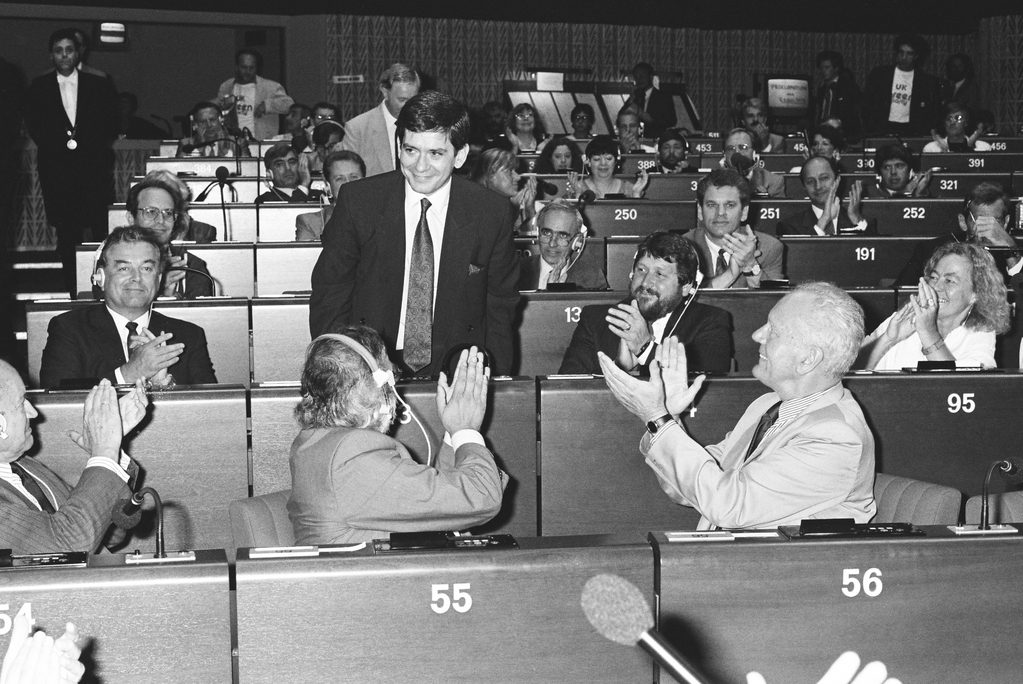 Election of the new EP President Enrique Barón Crespo during the plenary session in Strasbourg on the 25th of July 1989. © European Communities 1989
Election of the new EP President Enrique Barón Crespo during the plenary session in Strasbourg on the 25th of July 1989. © European Communities 1989
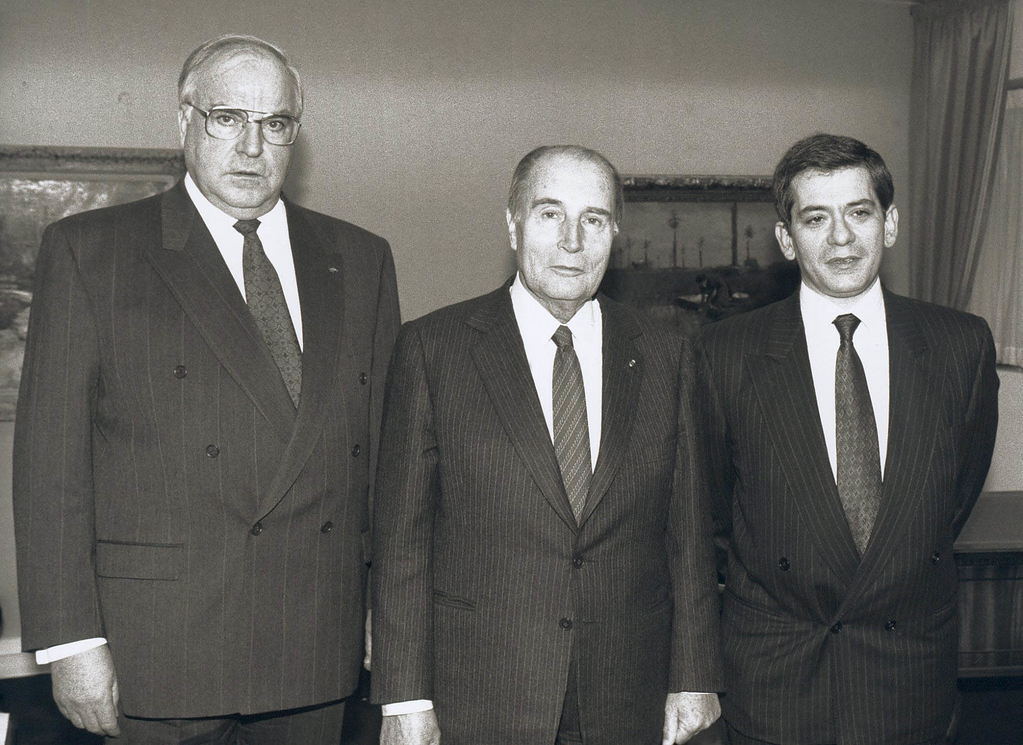 The German Chancellor Helmut Kohl (L) and French President François Mitterrand (C) address a solemn plenary session in Strasbourg in November 1989 following the fall of the Berlin Wall. Photo with EP President Enrique Barón Crespo (R) © European Union 1989 – European Parliament
The German Chancellor Helmut Kohl (L) and French President François Mitterrand (C) address a solemn plenary session in Strasbourg in November 1989 following the fall of the Berlin Wall. Photo with EP President Enrique Barón Crespo (R) © European Union 1989 – European Parliament
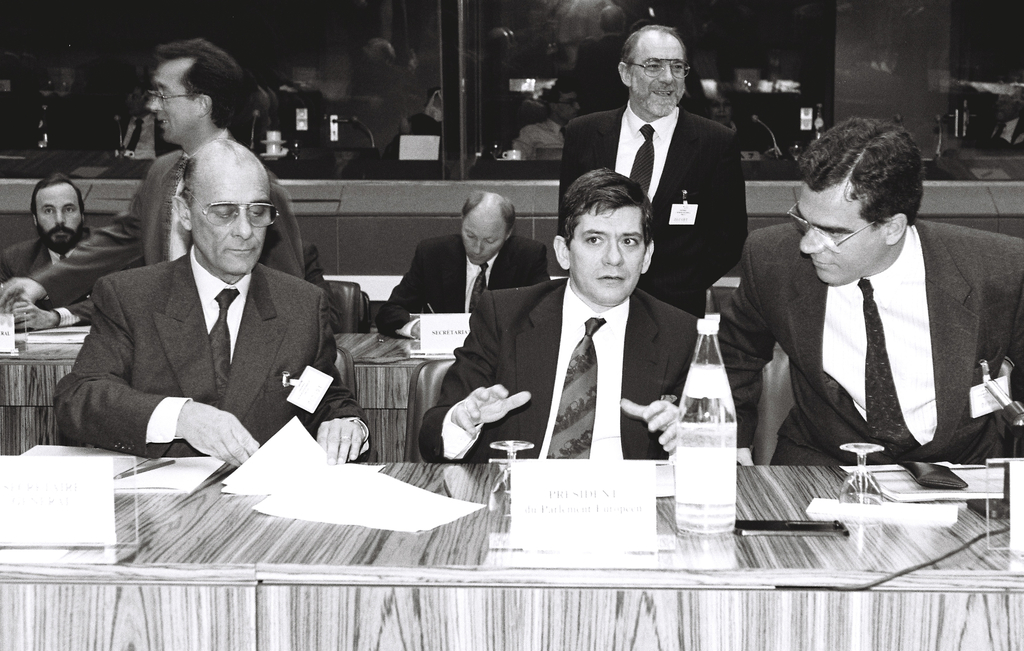 President Barón Crespo (R) and Secretary-General Enrico Vinci (L) at the Interinstitutional Conference in Luxembourg on April 8, 1991. © European Communities 1991 – European Parliament
President Barón Crespo (R) and Secretary-General Enrico Vinci (L) at the Interinstitutional Conference in Luxembourg on April 8, 1991. © European Communities 1991 – European Parliament
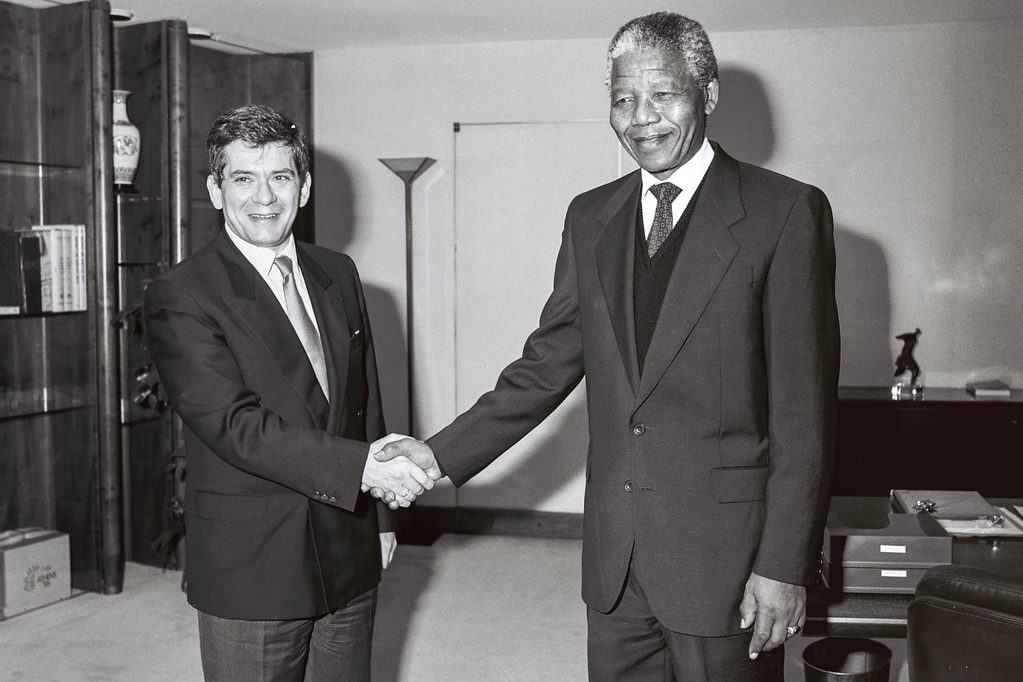 Sakharov Prize Winner Nelson Mandela (R) meets with EP President Enrique Barón Crespo (L) in Strasbourg © European Communities 1990
Sakharov Prize Winner Nelson Mandela (R) meets with EP President Enrique Barón Crespo (L) in Strasbourg © European Communities 1990
